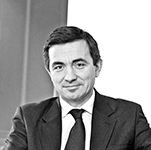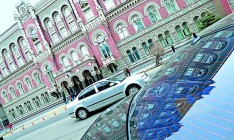Economy
ProspectsThe economic growth achieved over the years of independence may fall victim to the financial crisis and the military conflict

Ukraine will celebrate the 23rd anniversary of its independence in quite a poor condition. The political crisis, the annexation of Crimea and the protracted military operation in the Donbas have shaken the country’s fragile economy. For the first six months against the background of a recession there was an outflow of foreign capital and the national currency devalued to a historic low of UAH 13.13/USD from UAH 7.99/USD at the start of the year. In connection with the latter there was a decline in the growth rate of retail turnover. On top of that inflation, which has increased by 12% since the beginning of the year, had a negative impact on Ukrainians’ consumer confidence. The current challenges that our country is facing have become, perhaps, the most unpredictable that Ukraine has seen over the 23 years of its independence.
Payback time
During the years of independence Ukraine fell into considerable debts. Today the national debt, taking into account internal and external liabilities, is UAH 821.8 bn, equal to US $69.5 bn, according to the Ministry of Finance. Despite that this year the government has made a series of payments, devaluation did not allow for reducing the debt, instead multiplying it. According to the Ministry of Finance, since the beginning of the year the total public debt has decreased by US $3.6 bn (5%), but in hryvnya equivalent it increased by 40.6% (UAH 237 bn). Finance Minister Oleksandr Shlapak says the government planned the budget based on the exchange rate of UAH 10,80/USD by the end of the year, while during the voting the rate was already UAH 12,00/USD. For that matter the Ministry of Finance revised the budget for the current year and increased expenditures not only for servicing of debts, but also for the maintenance of diplomats and military attaches, which is done in foreign currency.
Stubborn recession
After the chaotic 1990s, when the country's GDP persistently showed no growth, foreign markets drove economic growth in Ukraine. In 2000 the domestic economy showed an increase of 5.9% for the first time. That year industry, in particular steel mills and chemical plants, made a major contribution. Nevertheless, for a long time the country could not regain the momentum that had been achieved during the times of the Soviet Union. Since 1990 and throughout the 1990s the decline in industrial production varied and in 1994 reached 28.2%. It was only in 2006 that Ukraine was able to surpass industrial performance of 1990 by 0.8%. The current situation again raises concerns. Due to the military operations in the Donbas, where the lion's share of the country’s enterprises is located, large industry is in recession, similar to that in the midst of the crisis in 2008 – 2010. According to the latest data from the State Statistics Service, in July the decline in industrial production has accelerated to 12.1% compared to the previous month. And based on results of the first seven months of this year compared to the same period in 2013 the decline was 5.8%. In terms of regions the decline in production in the Donetsk and Luhansk oblasts compared to June was an unimaginable 28.5% and 56.0%, respectively.
Market ambivalence
All Ukrainian governments have necessarily spoken of the need for development of import substitution programs. But hardly any of them was able to implement these goals. Some experts agree that numerous decent programs and initiatives failed due to the refusal of every new Cabinet of Ministers to pursue or continue the policy of its predecessors. Today, the problem of product sales for Ukrainian enterprises has become more critical than ever due to strained relations between Kyiv and Moscow. The trade turnover with Russia remains much higher for Ukraine than with any other country. Last year it was close to US $38 bn. The other day Premier Arseniy Yatsenyuk said that if commercial relations with Russia are suspended the loss for Ukrainian industrialists at year-end would amount to more than US $5 bn. At the same time, in April, prior to the introduction of reciprocal sanctions, Yatsenyuk said that the first and the best way out is to shift to the domestic market and search for markets in Europe. “In order to become a competitive country, we will have to work hard to overcome the difficulties and then storm foreign markets and restore the domestic market,” the premier firmly stated.
Based on the government’s estimates presented in July at the meeting with industrialists, the country’s needs in engineering products exceed several billions of dollars. That is why the program of modernization of passenger railway cars is considered by the government to be a possible compensator for individual producers. Even earlier another variant for implementation of this program was the possibility of granting state guarantees to Ukrzaliznytsya. At the same time, other manufacturers, especially in the military and industrial sector, fear that once isolated from Russian clients, their enterprises will be forced out of business. President of Motor Sich Vyacheslav Bohuslayev says the demand for his company’s products in Ukraine does not compensate its losses.
Along with that, as the source explained foreign markets, in particular in third world countries, are already loaded to the maximum with orders, so there are no other markets to search for. Senior Analyst at the International Centre for Policy Studies (ICPS) Oleksandr Zholud notes that the binding of certain enterprises to Russian customers was quite substantial. The work on contracts with Russia allowed businesses to not be concerned about marketing, though at the same time did not force them to look for new markets. “We have been too tightly bound to trade with Russia and now we have to compensate for this by developing trade with other countries. But this does not mean that trade with Russia should be reduced,” the analyst stressed.
Greetings from the past
Over the years of Ukraine’s independence Kyiv could not fully resolve a number of issues related to the Soviet times. The peak of their discussions coincides with the periods of political or trade confrontations with former republics of the Soviet Union, mainly Russia. In fact, our country is the only one of the 15 former Soviet republics which has not put an end to the distribution of assets of the USSR.
The new round of deterioration of relations with Russia has once again forced the Ukrainian government to raising the issue of distribution of assets remaining after the collapse of the Soviet Union. “Ukraine has legitimate and legal claims against Russia regarding the property which the latter has illegally appropriated,” said Yatsenyuk.
According to the publication, the Cabinet decided to establish a working group and find possible ways to protect the interests of the state in matters of succession in reference to the external public debt and assets of the former Soviet Union. The relevant draft resolution (at the disposal of Capital) was considered by the government at its meeting last week. The group will have to develop recommendations on methods and types of assets for Ukraine to challenge. Actually, there is plenty to fight for. According to the 1983 Vienna Convention, Ukraine’s share in the USSR amounted to 16.37%. Back in the 1990s Kyiv demanded from Moscow information about the gold reserve, the diamond fund and the assets of banks of the former Soviet Union. The Kremlin, on the contrary, believes that there is nothing to discuss, because the question has been settled by intergovernmental agreements between the two countries.
Another problem, which Ukraine inherited from the Soviet era is return of citizens depreciated deposits in the Sberbank of the USSR and compensation for related losses. A rule of thumb is that the debate of this issue in political circles is activated in pre-election periods.
Incentives for growth
There is no doubt that by the end of this year Ukraine will see economic decline. The only question is how severe will it be and what can be expected in 2015. Minister of Economic Development and Trade Pavlo Sheremeta says next year his ministry forecasts GDP growth and there are at least two scenarios for revival of the economy. He added, however, that they both hinge upon the completion of the military operations in the Donbas.
Based on the preliminary forecast of the Ministry of Economic Development in 2015 the economic growth may vary in the range of 0.3 – 2% with an inflation rate of 8.7 – 9.8%. At the same time, according to the calculations of the International Centre for Policy Studies, in terms of the drop of GDP in 2014 to 7% next year economic growth of 3.5% is quite possible. Zholud believes that this is possible if total control over the entire territory of Ukraine is regained, with the exception of Crimea. “In addition, we hope that economic cooperation will resume, including with Russia. We also anticipate an increase in trade with the EU after signing of the agreement on the free trade zone and its ratification,” said the expert.
In many aspects September will be indicative for the development of the economy in the coming years. In the beginning of the month the parliament is expected to examine a package of bills drafted to ensure economic growth. They relate to tax reform in the country, as well as reform of the system of public finances with an emphasis on provision of financial independence from the national budget in the regions. The premier expects that thanks to these laws the government will be able to alter the model of the national economy. “The current economic model in Ukraine can be described as follows: everyone is given a fish, but it is rotten, has remained frozen for too long and in addition it is a Soviet-style hake. We suggest that everybody is given a fishing rod, with a nice coil and a huge hook and catches a bigger and better fish,” said Yatsenyuk. However, over the years of independence, such promises have been made by all Ukrainian premiers, yet statistics show that in most cases they have remained only promises.
 Oleksandr Valchyshen,
Oleksandr Valchyshen,
Head of the Analytical Department at Investment Capital Ukraine (ICU)
For economic growth the business climate in the country must be revived, primarily for Ukrainian entrepreneurs. The size of business - small or large – does not matter. When things go well for entrepreneurs, business owners from other countries will come to our market. It is extremely important to reform the judicial branch of state power from servicing “wallets” into the state of protection of legitimate rights of citizens. For such revival we also need resuscitation of the credit market. There is no need to introduce mechanisms for compensation of interest rates from the national budget. This distorts competition instead of increasing the availability of resources. We require stress testing, recapitalization of banks, as well as increasing the level of credit analysis in the financial institutions in the process of issuing of loans.

Единственное жертвой чего стала наша экономика - олигархическая система и супер-эффективное управление страной. Ведь получить такое наследие после развала Совка, а в результате оказаться на уровне Нигерии тоже нужно постараться. И нынешняя власть не сильно торопится изменять ситуацию, иначе взяли бы Антикризисную программу коммуняки изучали ее, а не придумывали небылицы для запрета партии.






 of the agreement of syndication with Financial Times Limited are strictly prohibited. Use of materials which refers to France-Presse, Reuters, Interfax-Ukraine, Ukrainian News, UNIAN agencies is strictly prohibited. Materials marked
of the agreement of syndication with Financial Times Limited are strictly prohibited. Use of materials which refers to France-Presse, Reuters, Interfax-Ukraine, Ukrainian News, UNIAN agencies is strictly prohibited. Materials marked  are published as advertisements.
are published as advertisements.